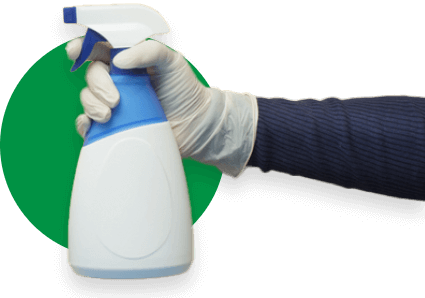So you want to start a commercial cleaning business. Launching a business of any kind is exciting and ambitious, and industrial cleaning services have the benefit of low overhead, market stability, and abundant growth potential. So you’ve already set yourself up for success in choosing a promising path forward.
You already know that you’re going to need some supplies, equipment, and staff. But you also know there’s a lot more to starting a business than that, and you’re ready to learn what it takes, from customer service and specialized expertise to insurance and marketing.
Coming up, we discuss everything you need to know before taking your first steps. This comprehensive guide covers the various ways to go about running a cleaning business and the advantages, answering every question about the process, including marketing and other secrets for success.
Janitorial Franchisee vs. Subcontractor vs. on Your Own
There are three main routes to establishing a janitorial business. You can become a subcontractor or franchisee, or build everything from scratch. Do you know the difference and the pros and cons of each?
Becoming a janitorial franchisee or subcontractor can offer more security with less risk and complexity than independently forming a business from the ground up. Dallas Janitorial Services has vendor and subcontractor opportunities so you can create your own success with the help of a reputable business with an established customer base.
Janitorial Franchise:
When you become a franchisee, you pay a bigger company for the ability to own and operate a small unit of that pre-established business.
You usually start with an initial franchise fee, then the company provides you with customers, marketing, billing, and collection services. The franchise fee may amount to about half of the accounts’ expected gross income.
Most franchisees enjoy the benefits of operating based on a business model and brand that’s already working, with potential clients and profits built in. There’s less risk and less to figure out on your own. Although you’re still your own boss, you have a bit less independence as a franchise, because you have to follow how the franchisor conducts business. Buying a franchise can also leave you with higher startup costs and general overhead.
Subcontractor:
Cleaning and janitorial subcontractors also have to obtain business licenses and do some networking. Subcontractors typically specialize in a specific skill, such as commercial or residential tasks like carpet cleaning, construction sites, or skyscraper exteriors. Though they have their own business and are self-employed, cleaning subcontractors serve clients on behalf of another company.
Janitorial subcontracting is often less risky than independently starting a cleaning business, but it requires expertise and specialized skills to be useful to a larger industrial cleaning service and gain the respect and trust of clients and other businesses/contractors. Cleaning subcontractors still need business licenses (probably about $500), and they need strong communication skills with attention to detail.
Dallas Janitorial Services offers opportunities for vendors and independent contractors with no franchise fees required. As a subcontractor, you will receive the benefits that national franchises don’t offer. Expect endless opportunities to generate more revenue for your business while maintaining your independence. In return, we’re looking for subcontractors who work as team players and maintain a positive attitude.
From Scratch:
Everything is up to you. You’re responsible for choosing a business structure, filing to form an LLC or corporation, making a business plan, taking on upfront and operating costs, doing taxes, marketing the business, permits, licensing, insurance, landing clients, billing, finding and paying staff, and providing customer service.
That’s a lot of responsibilities, risks, and new things to learn. But in return, you get full independence and no franchise fees.

The Benefits of a Commercial Cleaning Business
Picture your city’s skyline, plus the entire surrounding metro area. Every business and commercial building you see requires cleaning. While many businesses already utilize an in-house cleaning operation, they’re increasingly in need of outsourcing business cleaning services to a trustworthy commercial cleaning company.
Due to this high demand, the janitorial industry is a stable market with plenty of room to grow a successful business, especially since commercial cleaning services are a relatively simple product with low overhead and the promise of repeat business.
Stability
The janitorial services industry sees steady growth. Some figures show the contract cleaning industry growing from $78.6 billion to $100 billion between 2021 and 2026. By 2030, the number of commercial cleaning industry workers is expected to increase 6% from 2.2 million workers to 2.3 million.
Simplicity
In comparison to many other industries, home and business cleaning services deliver a fairly simple product. There is something to be said for having insider access to industry-standard products, supplies, equipment, and maintenance at scalable costs. Occupational safety and regulations are a big deal, but overall, cleaning is a relatively simple service.
Entry-Level Workforce
While your small cleaning business might start with just you or a handful of people you know, you eventually want to grow into a larger operation and employ 10-50 people. Since commercial cleaning doesn’t require extensive training or education, staffing that workforce is much less costly than other businesses.
Low Overhead
Depending on your business structure and specialization, starting a cleaning company usually doesn’t require much expensive equipment. Low overhead means your business has a better chance of fast growth. Starting small, you may make between $35,000 and $50,000 a year at first. As you grow to earn closer to $100,000, you can afford to invest in more equipment like vans for example, and yield even more growth.
Repeat Business
Of course, cleaning is never a one-and-done task. It’s a continuous job that businesses need routinely, for instance, offices generally receive business cleaning services three to five times weekly. So if you do a good cleaning job, it shouldn’t be too hard to stay busy.

How to Start a Commercial Cleaning Business
Now that you’re thinking about the benefits of starting a cleaning business and what type of business you want to get involved in, let’s get into the specifics and actionable steps to take.
1. Know the Business through Experience and Training
What kind of cleaning do you want to do? The more specialized the services, the more training and experience you need.
Working in the specific type of cleaning you’re interested in is the best way to learn about the skills, supplies/equipment, prices, pay, customers, and other aspects of how the business runs. Educate yourself on safe practices and regulations for substances that involve biohazards, air contaminants, or flammability.
2. Prioritize Customer Service Skills
You’ll probably be the one talking to customers at first. But even if you have training and experience in the commercial cleaning industry, you may not have customer service experience.
Find connections and online resources to help build the soft skills integral to communicating effectively with customers and associates.
3. Decide on Franchising or Starting on Your Own
Earlier, we differentiated franchising vs. subcontracting vs. starting a cleaning business on your own, noting that becoming a subcontractor comes with fewer risks and lower expenses. If you’re still not sure which is the best fit for you, continue researching all the requirements of each business path.
4. Arrange a Business Plan
It takes organization, business savvy, and long- and short-term planning abilities to start any business and keep it running. From the big picture down to meticulous details, a well-thought-out business plan will break down your vision into singular objectives, strategies, and steps. A solid business plan is a must for financing or partnerships with other businesses.
5. Decide Where to Locate
Consider starting your cleaning business from home to keep startup costs even lower. You might use space in your own home for office space and storage. Later, if you need more office and storage space and you have more revenue, it may be worth branching out. Just be aware of any local ordinances, safety concerns, and EPA handling/storage guidelines.
6. Obtain Cleaning Equipment and Supplies
Since you’re starting out with prior experience and training in your chosen cleaning specialization, you should already know what you need to do the job right, and where to get equipment, products, and supplies.
7. Value Safety
From driving between commercial cleaning jobs and working in commercial settings with cleaning products and slip and fall risks, there are plenty of safety concerns to consider. Before starting a cleaning business, you must familiarize yourself with OSHA standards for the commercial cleaning industry.
8. Protect Your Business with Insurance
Even when you do all you can to prioritize safety, bad things could still happen to people and property. Many clients require their commercial cleaners to have liability insurance to cover injuries and property damage.
9. Manage Your Finances
With money coming in and moving around, keeping track of the finances is imperative. A budget is just the beginning, and you should also have a CRM and software for estimating, accounting, and funding.
10. Structure the Pricing for Your Commercial Cleaning Services
To be successful, you need to earn enough to be profitable while still offering a competitive rate. This is another area where previous experience helps. You likely already know how frequent and demanding various cleaning services and tasks are and a fair pay rate.
11. Determine Your Ideal Clientele
Many other factors will hinge on who you intend to serve. Once you know the kinds of cleaning you want to do and the pricing structure you want to work with, you can get more specific about what clients to look for based on your goal price point. Then, do market research to locate and reach the clients you want.
12. Gather a Cleaning Team
At the very beginning, you might be the only one cleaning, but if your work is good and you want to grow your success, you will have to produce a cleaning team, too. You can cover more ground, serve more customers, and become more profitable. Remember to invest adequately in finding and vetting hard workers.
Critical Factors to Have a Successful Commercial Cleaning Business
Here, we’ll highlight the most critical principles for success in launching a cleaning business:
- High Professional Standards: Completing each commercial cleaning job with excellence, attention to detail, and professionalism is a given. If you want the most loyal repeat customers, you also must uphold high standards in customer service, with an emphasis on responsiveness, insights, and accommodation.
- Staff: Especially since the cleaning industry has such high turnover, the professionals you hire are the biggest piece of the puzzle. Your overall success depends on having friendly, competent, dedicated employees who reflect your professional standards.
- Efficiency: Everything from cleaning to hiring, marketing, and digital bookings needs to break down into a consistent and efficient process, so you avoid wasting time and money.
Next, find out some tips for marketing commercial cleaning services.
Different Ways to Market Your Commercial Cleaning Business
It’s more than ever to win over potential clients’ attention. Though digital marketing has become a huge deal, there’s still value in old-school marketing methods.
Use Traditional Marketing to Promote Your Commercial Cleaning Company
Traditional marketing channels like TV, radio, and print ads can still help get your cleaning business’s name out there. You can also hand out businesses and brochures, send postcards, and put out flyers nearby commercial buildings you already clean.
One of the most valuable forms of traditional marketing for cleaning companies is incentivizing clients to make referrals and following up on word-of-mouth leads.
Invest in Digital Marketing for Your Commercial Cleaning Business Growth
Digital marketing is crucial because online is the first place everyone goes to find what they need. In order to compete for business, your cleaning company needs a website, preferably with a blog, and an active social media presence. Invite clients to connect with you, like posts, write online reviews, and sign up for an email newsletter, possibly with discounts available.
Don’t rule out paying for online ads on social media and elsewhere, and don’t forget to set up your business listing on Google My Business for free to help prospective clients find you.
Start Your Commercial Cleaning Business as a Janitorial Cleaning Subcontractor
If you’re serious about having your own cleaning company, chances are you already have familiarity with the business. But there is a plethora of other elements you have to learn about and execute properly.
Becoming a cleaning subcontractor or vendor might be for you if you’re willing to leave most of the technical stuff to a company that already has it down so you can focus more on cleaning and making customers happy.
Pros:
- Benefit from an established business model and brand
- No franchise fees
- Pre-established customers
- A faster way to get a profitable cleaning business off the ground
Cons
- You may not have full control over your schedule
FAQs on How to Start a Commercial Cleaning Business
How profitable is a commercial cleaning company?
Depending on the economy and insurance, licensing/certification, and operating expenses, a cleaning business can eventually make over $100,000 per year.
Is it worth starting a cleaning business?
Cleaning is a stable industry with low startup costs and overhead. With industry know-how, dedication, and smart decision-making, it’s worth starting a cleaning business to take control of your future.
How do I start my own cleaning business from scratch?
To start a cleaning business from scratch, you need cleaning experience, customer service skills, a business plan, a legal entity, a team, cleaning equipment/supplies, insurance, licensing, a pricing structure, clients, and a way to manage finances.
What licenses are needed to start a cleaning business?
The type of license depends on your specialization and whether you’re a franchisee/vendor, subcontractor, or independent commercial cleaning business owner. You may need a general and specialized business license, bonding, and insurance.
How to successfully run a cleaning business?
The biggest keys to successfully running a cleaning business are high standards, customer service, staff, and efficiency.
Why do you want to start your own cleaning business?
Are you passionate about building something, becoming more independent in your career, and serving customers alongside a happy, hardworking team? If so, the cleaning business is the perfect fit for you.
Commercial cleaning services are a stable market, offering plentiful opportunities to grow and prosper as a cleaning company if you have what it takes to be a commercial cleaning business owner.
Working with an established company gives you access to a proven business model, reputation, and client base, so it’s the quickest way to start a cleaning business. Contact us if you’re interested in Dallas Janitorial’s subcontractor and vendor opportunities.







